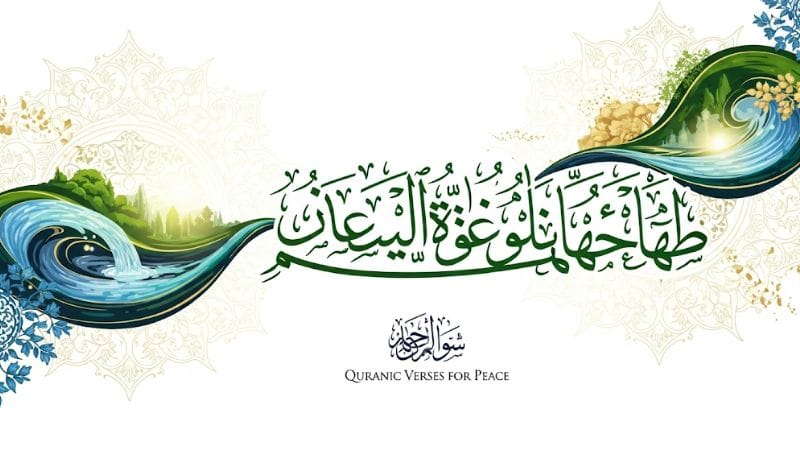In a world filled with uncertainty, stress, and challenges, many of us seek solace, guidance, and a sense of purpose. For Muslims, the Quran is not just a holy book but a timeless source of wisdom, comfort, and transformation. Within its verses lie powerful duas (supplications) that have the potential to change lives, offering hope, healing, and a deeper connection with Allah (SWT). This article delves into some of the most profound Quran verses that contain duas—verses that, when understood and recited with sincerity, can unlock hidden power in your life.

These duas are more than words; they are divine prescriptions for the soul. Whether you’re seeking forgiveness, protection, success, or peace, the Quran provides supplications for every need. In this comprehensive guide, we’ll explore ten life-changing Quran verses, their meanings, and how to incorporate them into your daily routine. We’ll also provide resources, reviews, and insights to help you deepen your understanding and practice of these powerful duas.
Introduction: The Transformative Power of Quranic Duas
The Quran is often described as a “healing and mercy for the believers” (Surah Al-Isra 17:82). Its verses are a direct communication from Allah (SWT), offering guidance for every aspect of life. Among these verses are duas—supplications that prophets, righteous individuals, and even Allah Himself taught us to recite. These duas are not mere requests; they are keys to unlocking divine mercy, wisdom, and blessings.
The Prophet Muhammad (PBUH) emphasized the importance of dua, saying, “Dua is the essence of worship” (Tirmidhi). By turning to Allah through these Quranic supplications, we acknowledge our dependence on Him, strengthen our faith, and invite His grace into our lives. This article will introduce you to ten powerful Quran verses that contain duas, each with the potential to transform your spiritual and worldly affairs.
Here’s what you’ll discover:
- Ten life-changing Quranic duas with their Arabic text, transliteration, and English meanings.
- The context and significance of each dua.
- Practical tips for incorporating these duas into your daily life.
- Recommended resources—books, apps, and courses—with prices, reviews, and ratings.
- Stories and insights to inspire your spiritual journey.
Let’s embark on this journey of discovery and see how these Quran verses can change your life forever.
Why Quranic Duas Are Essential for Every Muslim
A Direct Line to Allah
Dua is a profound act of worship that connects us directly to Allah (SWT). The Quran states, “And your Lord says, ‘Call upon Me; I will respond to you’” (Surah Ghafir 40:60). This promise is a source of immense comfort, especially in times of distress. Quranic duas are particularly powerful because they are divinely inspired, carrying the exact words Allah has chosen for us to use in supplication.
Read more:
Spiritual, Emotional, and Practical Benefits
Reciting Quranic duas offers a multitude of benefits:
- Spiritual Growth: These duas deepen your relationship with Allah, fostering humility and gratitude.
- Emotional Healing: They provide comfort during anxiety, grief, or uncertainty, as seen in verses like the Dua of Prophet Yunus (AS).
- Guidance and Success: Many duas ask for knowledge, wisdom, and success in worldly and spiritual matters.
- Protection: Verses like Ayat al-Kursi offer divine protection from harm and evil.
By incorporating these duas into your life, you invite Allah’s mercy and guidance into every moment.
10 Life-Changing Quran Verses with Powerful Duas
Below are ten carefully selected Quran verses that contain duas, each with the power to transform your life. For each verse, you’ll find the Arabic text, transliteration, English translation, and guidance on when and how to use it.
1. Dua for Forgiveness and Mercy (Surah Al-A’raf 7:23)
This dua was recited by Prophet Adam and Hawwa (AS) after their mistake in Paradise, seeking Allah’s forgiveness.
Arabic:
رَبَّنَا ظَلَمْنَا أَنْفُسَنَا وَإِنْ لَمْ تَغْفِرْ لَنَا وَتَرْحَمْنَا لَنَكُونَنَّ مِنَ الْخَاسِرِينَ
Transliteration:
Rabbana zalamna anfusana wa in lam taghfir lana wa tarhamna lanakunanna minal-khasirin.
Translation:
“Our Lord, we have wronged ourselves, and if You do not forgive us and have mercy upon us, we will surely be among the losers.”
When to Recite:
- After committing a sin or feeling guilt.
- During repentance (tawbah) sessions.
Significance: This dua teaches humility and reliance on Allah’s mercy, reminding us that forgiveness is always within reach.
How It Can Change Your Life: By reciting this, you acknowledge your imperfections and invite Allah’s forgiveness, which purifies the heart and brings peace.
2. Dua for Guidance and Steadfastness (Surah Aal-E-Imran 3:8)
This dua asks Allah to keep our hearts firm on the straight path.
Arabic:
رَبَّنَا لَا تُزِغْ قُلُوبَنَا بَعْدَ إِذْ هَدَيْتَنَا وَهَبْ لَنَا مِنْ لَدُنْكَ رَحْمَةً ۚ إِنَّكَ أَنْتَ الْوَهَّابُ
Transliteration:
Rabbana la tuzigh qulubana ba’da idh hadaytana wa hab lana min ladunka rahmatan innaka antal-wahhab.
Translation:
“Our Lord, let not our hearts deviate after You have guided us and grant us from Yourself mercy. Indeed, You are the Bestower.”
When to Recite:
- After Salah or during qunut in Witr prayer.
- When seeking to strengthen your faith.
Significance: This dua reflects a plea for unwavering faith and divine mercy, essential for spiritual growth.
How It Can Change Your Life: It helps maintain focus on your spiritual path, preventing distractions and doubts.
3. Dua for Ease and Success (Surah Taha 20:25-26)
Recited by Prophet Musa (AS) before confronting Pharaoh, this dua seeks ease and clarity.
Arabic:
رَبِّ اشْرَحْ لِي صَدْرِي وَيَسِّرْ لِي أَمْرِي
Transliteration:
Rabbishrah li sadri wa yassir li amri.
Translation:
“My Lord, expand for me my breast [with assurance] and ease for me my task.”
When to Recite:
- Before challenging tasks or conversations.
- When feeling overwhelmed.
Significance: This dua is a plea for confidence and ease, showcasing reliance on Allah in difficult moments.
How It Can Change Your Life: It calms the heart and mind, helping you approach challenges with clarity and courage.
4. Dua for Protection (Ayat al-Kursi, Surah Al-Baqarah 2:255)
Though not a dua in the traditional sense, Ayat al-Kursi is recited for protection and blessings.
Arabic:
اللَّهُ لَا إِلَٰهَ إِلَّا هُوَ الْحَيُّ الْقَيُّومُ ۚ لَا تَأْخُذُهُ سِنَةٌ وَلَا نَوْمٌ ۚ لَهُ مَا فِي السَّمَاوَاتِ وَمَا فِي الْأَرْضِ ۗ مَنْ ذَا الَّذِي يَشْفَعُ عِنْدَهُ إِلَّا بِإذْنِهِ ۚ يَعْلَمُ مَا بَيْنَ أَيْدِيهِمْ وَمَا خَلْفَهُمْ ۖ وَلَا يُحِيطُونَ بِشَيْءٍ مِنْ عِلْمِهِ إِلَّا بِمَا شَاءَ ۚ وَسِعَ كُرْسِيُّهُ السَّمَاوَاتِ وَالْأَرْضَ ۖ وَلَا يَئُودُهُ حِفْظُهُمَا ۚ وَهُوَ الْعَلِيُّ الْعَظِيمُ
Transliteration:
Allahu la ilaha illa huwal-hayyul-qayyum, la ta’khudhuhu sinatun wa la nawm, lahu ma fis-samawati wa ma fil-ard, man dhal-ladhi yashfa‘u ‘indahu illa bi’idhnih, ya‘lamu ma bayna aydihim wa ma khalfahum, wa la yuhituna bi shay’im min ‘ilmihi illa bima sha’, wasi‘a kursiyyuhus-samawati wal-ard, wa la ya’uduhu hifzuhuma, wa huwal-‘aliyyul-‘azim.
Translation:
“Allah! There is no god but He, the Ever-Living, the Sustainer of existence. Neither drowsiness overtakes Him nor sleep. To Him belongs whatever is in the heavens and whatever is on the earth. Who is it that can intercede with Him except by His permission? He knows what is before them and what is behind them, and they encompass not a thing of His knowledge except for what He wills. His Kursi extends over the heavens and the earth, and their preservation tires Him not. And He is the Most High, the Most Great.”
When to Recite:
- After every Salah for protection.
- Before sleeping to safeguard against harm.
Significance: The Prophet (PBUH) said, “Whoever recites Ayat al-Kursi after every obligatory prayer, nothing stands between him and Paradise except death” (Sahih Bukhari).
How It Can Change Your Life: It provides a sense of security and divine protection, alleviating fears and anxieties.
5. Dua for Relief from Distress (Surah Al-Anbiya 21:87)
This dua was recited by Prophet Yunus (AS) while in the belly of the whale.
Arabic:
لا إِلَٰهَ إِلَّا أَنْتَ سُبْحَانَكَ إِنِّي كُنْتُ مِنَ الظَّالِمِينَ
Transliteration:
La ilaha illa anta subhanaka inni kuntu minaz-zalimin.
Translation:
“There is no deity except You; exalted are You. Indeed, I have been of the wrongdoers.”
When to Recite:
- During moments of despair or hardship.
- Daily for spiritual cleansing.
Significance: Allah responded to this dua by saving Prophet Yunus (AS), demonstrating its power in the darkest times.
How It Can Change Your Life: It teaches surrender and humility, bringing relief and hope when all seems lost.
6. Dua for Knowledge and Wisdom (Surah Taha 20:114)
This dua seeks an increase in knowledge, a key to success in this life and the Hereafter.
Arabic:
رَبِّ زِدْنِي عِلْمًا
Transliteration:
Rabbi zidni ‘ilma.
Translation:
“My Lord, increase me in knowledge.”
When to Recite:
- Before studying or learning.
- When seeking clarity or wisdom.
Significance: Knowledge is highly valued in Islam, and this dua is a direct request for divine insight.
How It Can Change Your Life: It opens doors to understanding, helping you make better decisions and grow spiritually.
7. Dua for Success in This Life and the Hereafter (Surah Al-Baqarah 2:201)
This dua balances worldly aspirations with spiritual goals.
Arabic:
رَبَّنَا آتِنَا فِي الدُّنْيَا حَسَنَةً وَفِي الْآخِرَةِ حَسَنَةً وَقِنَا عَذَابَ النَّارِ
Transliteration:
Rabbana atina fid-dunya hasanatan wa fil-akhirati hasanatan wa qina ‘adhaban-nar.
Translation:
“Our Lord, give us in this world [that which is] good and in the Hereafter [that which is] good and protect us from the punishment of the Fire.”
When to Recite:
- After Salah or during dua sessions.
- When setting goals or making decisions.
Significance: This dua encapsulates the Muslim’s desire for success in both worlds, emphasizing balance.
How It Can Change Your Life: It aligns your intentions with Allah’s will, ensuring your pursuits are blessed.
8. Dua for Patience and Perseverance (Surah Al-Baqarah 2:250)
Recited by the companions of Prophet Dawud (AS), this dua seeks strength in adversity.
Arabic:
رَبَّنَا أَفْرِغْ عَلَيْنَا صَبْرًا وَثَبِّتْ أَقْدَامَنَا وَانْصُرْنَا عَلَى الْقَوْمِ الْكَافِرِينَ
Transliteration:
Rabbana afrigh ‘alayna sabran wa thabbit aqdaman wa ansurna ‘alal-qawmil-kafirin.
Translation:
“Our Lord, pour upon us patience and plant firmly our feet and give us victory over the disbelieving people.”
When to Recite:
- During trials or challenges.
- When facing opposition or difficulty.
Significance: This dua is a plea for resilience and divine support in tough times.
How It Can Change Your Life: It strengthens your resolve, helping you endure hardships with grace.
9. Dua for Acceptance of Good Deeds (Surah Al-Ma’idah 5:114)
This dua was recited by Prophet Isa (AS), asking Allah to accept his efforts.
Arabic:
اللَّهُمَّ رَبَّنَا أَنْزِلْ عَلَيْنَا مَائِدَةً مِنَ السَّمَاءِ تَكُونُ لَنَا عِيدًا لِأَوَّلِنَا وَآخِرِنَا وَآيَةً مِنْكَ وَارْزُقْنَا وَأَنْتَ خَيْرُ الرَّازِقِينَ
Transliteration:
Allahumma rabbana anzil ‘alayna ma’idatan minas-sama’i takunu lana ‘idan li awwalina wa akhirina wa ayatan minka warzuqna wa anta khayrur-razigin.
Translation:
“O Allah, our Lord, send down to us a table [spread with food] from the heaven to be for us a festival for the first of us and the last of us and a sign from You. And provide for us, and You are the best of providers.”
When to Recite:
- After performing good deeds or acts of worship.
- When seeking Allah’s acceptance and blessings.
Significance: This dua reflects gratitude and a desire for Allah’s approval.
How It Can Change Your Life: It encourages sincerity in worship, ensuring your actions are for Allah’s pleasure.
10. Dua for Contentment and Gratitude (Surah Ibrahim 14:7)
Though not a direct dua, this verse reminds us to be grateful, which is a form of supplication.
Arabic:
وَإِذْ تَأَذَّنَ رَبُّكُمْ لَئِنْ شَكَرْتُمْ لَأَزِيدَنَّكُمْ ۖ وَلَئِنْ كَفَرْتُمْ إِنَّ عَذَابِي لَشَدِيدٌ
Transliteration:
Wa idh ta’adhana rabbukum la’in shakartum la’azidannakum wa la’in kafartum inna ‘adhabi lashadid.
Translation:
“And [remember] when your Lord proclaimed, ‘If you are grateful, I will surely increase you [in favor]; but if you deny, indeed, My punishment is severe.’”
When to Recite:
- Daily, as a reminder to practice gratitude.
- When feeling discontent or ungrateful.
Significance: Gratitude is a powerful form of dua, inviting more blessings into your life.
How It Can Change Your Life: It fosters a positive mindset, helping you appreciate Allah’s gifts and attract more.
How to Incorporate These Duas into Your Daily Life
To truly benefit from these Quranic duas, consistency is key. Here’s how to make them a part of your routine:
- Memorize One Dua at a Time
Start with shorter duas like Rabbi zidni ‘ilma and gradually move to longer verses. Use audio recitations to aid memorization. - Recite During Salah
Incorporate these duas into your prayers, especially during sujood or after tashahhud. - Create a Dua Journal
Write down each dua with its meaning and reflect on how it applies to your life. - Set Reminders
Use apps like Muslim Pro to schedule daily dua reminders. - Teach Others
Share these duas with family and friends, reinforcing your own memory and spreading blessings. - Reflect on Their Meanings
Before reciting, take a moment to understand the dua’s context and significance, deepening your connection.
Recommended Resources to Deepen Your Understanding
To further explore these Quranic duas, consider these trusted resources. Each includes costs, reviews, and ratings to help you choose.
Books
- “The Quran: English Meanings and Notes” by Saheeh International
- Description: A clear, modern translation of the Quran with concise notes.
- Price: $15–$20 (paperback).
- Rating: 4.9/5 (Amazon).
- Review: “The best English translation I’ve read—clear and faithful” (user review).
- Where to Buy: Amazon or Islamic bookstores.
- “Du’a: The Weapon of the Believer” by Yasir Qadhi
- Description: An in-depth exploration of dua’s significance and etiquette.
- Price: $12–$18.
- Rating: 4.7/5 (Goodreads).
- Review: “A must-read for every Muslim—practical and inspiring” (user review).
- Where to Buy: Online retailers or Islamic publishers.
Mobile Apps
- Quran Companion
- Features: Memorization tools, audio recitations, and progress tracking.
- Price: Free with in-app purchases.
- Rating: 4.8/5 (Google Play).
- Review: “Helped me memorize Surahs faster than ever!” (user review).
- Download: iOS/Android app stores.
- Muslim Pro
- Features: Quran, dua library, prayer times, and Qibla finder.
- Price: Free; Premium $9.99/year.
- Rating: 4.5/5 (App Store).
- Review: “The dua section is fantastic—easy to use and comprehensive” (user review).
- Download: iOS/Android app stores.
Online Courses
- Bayyinah Institute: Quranic Reflections
- Description: A course exploring the Quran’s themes and lessons.
- Price: $99–$150.
- Rating: 4.9/5 (student feedback).
- Review: “Transformative—deepened my love for the Quran” (student review).
- Access: Bayyinah TV website.
- SeekersGuidance: The Power of Dua
- Description: A free course on the etiquette and impact of dua.
- Price: Free.
- Rating: 4.8/5 (student reviews).
- Review: “Practical and uplifting—highly recommend” (student review).
- Access: SeekersGuidance.org.
Fee Structure Overview
| Resource | Type | Price | Notes |
|---|---|---|---|
| The Quran: English Meanings | Book | $15–$20 | Clear translation |
| Du’a: The Weapon of the Believer | Book | $12–$18 | In-depth on dua |
| Quran Companion | App | Free (in-app purchases) | Memorization focus |
| Muslim Pro Premium | App | $9.99/year | Comprehensive Islamic app |
| Bayyinah Quranic Reflections | Course | $99–$150 | Thematic Quran study |
| SeekersGuidance Dua Course | Course | Free | Etiquette and power of dua |
Real-Life Stories: How These Duas Changed Lives
The power of Quranic duas is not just theoretical—it’s transformative. Here are a few stories:
- Fatima, 29: “Reciting Rabbana atina fid-dunya hasanatan daily shifted my focus. I stopped chasing material success and found peace in balancing dunya and akhirah.”
- Ahmed, 42: “During a financial crisis, I turned to the Dua of Prophet Yunus. It was like a weight lifted—I felt Allah’s mercy envelop me, and soon, opportunities appeared.”
- Layla, 35: “Memorizing Ayat al-Kursi gave me courage. I used to fear the dark, but now, I feel protected wherever I am.”
These testimonies highlight how Quranic duas can bring tangible change, from emotional relief to life-altering blessings.
FAQs: Your Questions About Quranic Duas Answered
Can I Recite Duas in My Native Language?
Yes, Allah (SWT) understands all languages. While reciting Quranic duas in Arabic carries special blessings, you can also make personal supplications in your language.
How Often Should I Recite These Duas?
Consistency is key. Aim to recite them daily, especially after Salah or during moments of reflection. Some, like Ayat al-Kursi, are recommended after every prayer.
What If I Don’t Feel Immediate Results?
Spiritual growth takes time. Trust in Allah’s wisdom and continue reciting with sincerity. The benefits may unfold gradually, strengthening your faith.
Can I Share These Duas with Non-Muslims?
Absolutely! Sharing the beauty of Islam is encouraged. These duas can inspire anyone seeking peace or guidance.
Conclusion: Unlock the Hidden Power of These Quran Verses
The ten Quran verses shared in this guide are more than supplications—they are divine gifts, each with the power to transform your life. From seeking forgiveness to gaining knowledge, these duas address every human need, offering a path to spiritual fulfillment and worldly success. The Prophet (PBUH) said, “The Quran is an intercessor, something given permission to intercede, and it is rightfully believed in. Whoever puts it in front of him, it will lead him to Paradise” (Sahih Ibn Hibban).
Start today: choose one dua, memorize it, and recite it with an open heart. Explore the recommended books, apps, and courses to deepen your understanding. Share this article with others, and let us know in the comments which dua resonates with you most. For more Islamic inspiration, check out our posts on Daily Dhikr for Spiritual Growth or Understanding Tawakkul.
Call-to-Action: Download our free Quranic Dua Guide PDF by subscribing below. May Allah (SWT) make these verses a source of light and transformation in your life. Ameen.
About the Author: [Your Name] is a dedicated writer passionate about Islamic spirituality and personal growth. With extensive research into the Quran and Hadith, [Your Name] brings authentic, uplifting content to help Muslims thrive in their faith and daily lives.














Post Comment